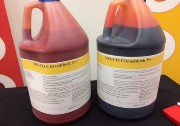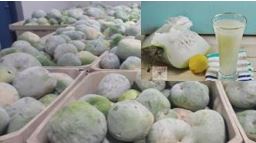| Xiuxiu Sun |

|
|
Contact Information USDA-ARS Daniel K. Inouye U.S. Pacific Basin Agricultural Research Center |
|
Publications
via ARIS system
via Google scholar
Education
Ph.D., Nutrition and Food Science, Wayne State University, 2014
M.E., Food Science, Jilin University, 2008
B.E., Food Science and Engineering, Jilin University, 2006
Academic Positions
2021 – present, Research Food Technologist, USDA-ARS, U.S. Pacific Basin Agricultural Research Center, Hilo, Hawaii
2017 – 2021, Research Associate, USDA-ARS, U.S. Horticultural Research Laboratory, Fort Pierce, Florida
2014 – 2016, Research Associate, University of Florida, Institute of Food and Agricultural Sciences, Fort Pierce, Florida
Research Accomplishments

Active packaging to reduce decay and prolong fruit shelf-life
Designed and conducted research to mitigate the risk of microorganisms and improve food quality. Developed antimicrobial microencapsulation system with essential oils (e.g. carvacrol, thymol, bergamot oil) imbedded in a pectin and sodium alginate matrix. The newly developed microencapsulation phytosanitary system extensively improved blueberry quality and safety by reducing microbial populations, weight loss and softening, while improving taste.

 Worked with Worrell Water Technologies to develop a modified atmosphere packaging system using novel controlled-release chlorine dioxide powder in a newly designed perforated packaging system for fresh and fresh-cut fruit (strawberry, blueberry, cherry tomato, citrus, and fresh-cut honeydew) storage. The novel chlorine dioxide phytosanitary system extended shelf life of tomatoes up to a week by reducing decay rate and weight loss. The chlorine dioxide-treated tomatoes maintained firmness and taste which deteriorated in untreated fruit. The chlorine dioxide treatment reduced surface microbial populations, including those of E. coli, Xanthomonas citri subsp. citri (causative agent of citrus canker), and the economically important citrus post-harvest spoilage pathogen P. digitaum. It also reduced stem-end rot incidence on grapefruit.
Worked with Worrell Water Technologies to develop a modified atmosphere packaging system using novel controlled-release chlorine dioxide powder in a newly designed perforated packaging system for fresh and fresh-cut fruit (strawberry, blueberry, cherry tomato, citrus, and fresh-cut honeydew) storage. The novel chlorine dioxide phytosanitary system extended shelf life of tomatoes up to a week by reducing decay rate and weight loss. The chlorine dioxide-treated tomatoes maintained firmness and taste which deteriorated in untreated fruit. The chlorine dioxide treatment reduced surface microbial populations, including those of E. coli, Xanthomonas citri subsp. citri (causative agent of citrus canker), and the economically important citrus post-harvest spoilage pathogen P. digitaum. It also reduced stem-end rot incidence on grapefruit.
 Developed antimicrobial chitosan/gallic acid films and determined the antimicrobial, engineering properties and microstructure of these films. Investigated the antimicrobial and mechanical properties of chitosan films incorporated with various concentrations of the complex of β-cyclodextrin and essential oils (β-CD/EO). Developed an active packaging system using chitosan-essential oil edible coatings to improve microbiological safety and quality of food. The newly developed films could be used as food packaging material due to their excellent structural, mechanical, and antimicrobial properties. The chitosan coatings improved antimicrobial activity against E. coli and Penicillium digitatum, and maintained fruit firmness during storage.
Developed antimicrobial chitosan/gallic acid films and determined the antimicrobial, engineering properties and microstructure of these films. Investigated the antimicrobial and mechanical properties of chitosan films incorporated with various concentrations of the complex of β-cyclodextrin and essential oils (β-CD/EO). Developed an active packaging system using chitosan-essential oil edible coatings to improve microbiological safety and quality of food. The newly developed films could be used as food packaging material due to their excellent structural, mechanical, and antimicrobial properties. The chitosan coatings improved antimicrobial activity against E. coli and Penicillium digitatum, and maintained fruit firmness during storage.
 Examined the properties of natural colorants and their application in wax coatings for post-harvest citrus fruit, and the suitability of five oil-soluble natural colorants on citrus fruit peel color were compared. The developed wax application showed that carnauba coating containing paprika oleoresin enhanced fruit appearance and extended shelf-life, which was adopted for commercial use by DECCO US Post-Harvest, Inc.
Examined the properties of natural colorants and their application in wax coatings for post-harvest citrus fruit, and the suitability of five oil-soluble natural colorants on citrus fruit peel color were compared. The developed wax application showed that carnauba coating containing paprika oleoresin enhanced fruit appearance and extended shelf-life, which was adopted for commercial use by DECCO US Post-Harvest, Inc.
 Value-added products development to enhance marketability
Value-added products development to enhance marketability
Conducted pioneering research on the development of low-sugar functional fruit drinks under a CRADA, focusing on devising advanced manufacturing technologies for flavor optimization using GC-MS and HPLC. Investigated the effect of cultivar and processing methods on the physical, chemical, nutritional, and sensory properties of low-sugar winter melon juice. Two methods were developed, which significantly improved the health benefit and taste of winter melon drinks, by increasing nutritional components, reducing sugar content, and improving taste by reducing bitterness.
Antimicrobial compound extraction
Separated and characterized bioactive components in marine sponges and graviola fruit using HPLC, columns, NMR, EI-MS etc. Evaluated the antimicrobial and antiproliferative activity of these compounds. The newly extracted compound crambescidin 800 expressed specific inhibitory activity on A. baumannii, K. pneumoniae, and P. aeruginosa.
Service, Leadership and Participation in Professional Activities:
- Member of American Chemical Society (ACS)
- Member of Institute of Food Technologists (IFT)
- Member of American Society for Horticultural Science (ASHS)
- Guest editor of Foods, Journal of Food Quality, Journal of Chemistry, and International Journal of Medicinal Chemistry
- Judge for the poster competition at the meeting of the American Society for Horticultural Science, 2018, Washington, DC
- Volunteer reviewer for the IFT20 Session Proposal
- Instructor for student participant of the St. Lucie County Science and Engineering Fair
Honors, Awards, Achievements and Recognition:
- Best Poster Award, 2019, International Symposium on Postharvest Pathology
- Best Paper Award, 2017, Florida State Horticultural Society
- Third Best Student Paper Award, 2015, Florida State Horticultural Society
- Summer Dissertation Fellowship, 2014, Wayne State University
- Thomas Rumble University Graduate Fellowship, 2013, Wayne State University
- Graduate Student Professional Travel Award, 2013, Wayne State University
- Graduate Professional Scholarship, 2012, Wayne State University
- University Graduate Research Fellowship, 2010, Wayne State University

